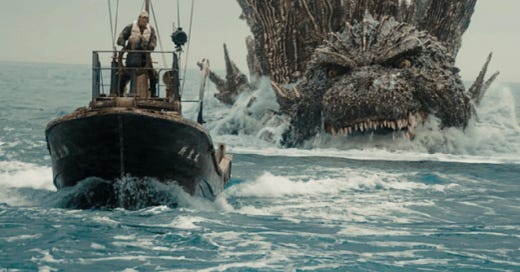Godzilla Minus One takes a premise that has been stretched beyond goofiness and injects it with gravitas and warmth. It puts to shame the recent American iterations of the famous kaiju.
Don’t get me wrong. I enjoyed Godzilla vs. Kong (2021) the same way I would enjoy a clown car colliding with a group of cybernetic ninjas. It made no sense, but it wasn’t supposed to. I grew up watching the old King Kong vs. Godzilla movie from 1963 and had a big smile on my face the entire time I was watching the new version. It took me back to my childhood when I played with a wind-up Godzilla figure that would shoot real sparks out of its mouth.
Just like my childhood, Godzilla vs. Kong (2021) is not an experience I will ever repeat. They don’t even sell tinderboxes disguised as toy monsters anymore. Alas.
But Godzilla Minus One is a real movie and one I’ll watch again. It’s also the perfect movie to watch with your kids and introduce them to the world of subtitles. The dialogue is easy to follow and doesn’t require a person to read at the speed of a hummingbird’s wings. Even if they miss something, the acting is good enough that they’ll perceive what is being communicated without words.
A Celebration of Normal, Everyday Men
The heroism in this movie is accomplished not by superheroes but by ordinary men. Most of these men are recent veterans of World War 2, already tired and beaten down from Japan’s defeat, used up by the Imperial Government. But there is also a scene where a bunch of tugboat captains come to the rescue at a pivotal moment.
Every character is likable, and every character gets their moment to shine. The main protagonist is a kamikaze pilot who refuses to kill himself in the final days of the war for a hopeless cause. This could be forgiven and, indeed, is forgiven early on. But he shows additional cowardice when he fails to fire on a smaller Godzilla. As a result, a small garrison is wiped out, and he carries this guilt with him for the rest of the film. For him, the war will not be over until he overcomes this great failure, and his redemption is a worthy story to tell.
Strong women characters also have great moments, but you’ll find no girl bosses and no pandering to modern sensibilities. This is a movie about the quiet resilience and courage of everyday men who do what they need to do to protect their ravaged homeland.
Reajudicating the War
Japan was in ruins after World War 2. Even if you ignore Hiroshima and Nagasaki, the firebombing caused devastation that is hard to imagine. The movie shines a light on that devastation. Many of Japan’s major cities might as well have been tossed in a blender and the rubble dumped back out on the mainland.
The name of the movie is a reference to this devastation. After World War 2, Japan is at zero. As they rebuild, they are almost rebuilding everything from scratch. When Godzilla appears on the scene, it sets them further back to negative one.
The movie can be seen as a rehabilitation of the veterans who served, giving them all heroic roles, and a repudiation of the Imperial Government who treated their lives as chaff to throw away in the war effort. Many fighter planes had no ejection seats, for example. There are multiple scenes excoriating the government for keeping information from the fighting men on the ground, pretending everything was going great when, in reality, they had no chance against the American war machine. The ingenious plan to defeat Godzilla, in contrast, is not a hopeless cause, and the architects intend for everyone to come back alive despite the high risk of the endeavor.
War is not treated as something desirable and glorious. One of the most moving scenes of the film involves the younger protagonist, who is the only one on the crew who didn’t serve in the war. He desires to prove himself and is angry when the older men refuse to allow him on the mission.
One of the men tells him, “Not having been to war is something to be proud of.” And as they walk away from the young man’s protests, the same older man says, “We leave you the future.”
The veterans desire to leave the next generation better off than they are, unstained by war. A future where, hopefully, the young men are not sacrificed to pointless bloodshed.
Many of Japan’s movies for the past seventy years have processed these same topics in different ways. When your culture is completely reset, it tends to leave a deep mark. Godzilla Minus One addresses the lingering wound in a way that feels natural and is still 100% entertainment.
Conclusion
If the movie were a little shorter, it would be perfect. It would have been easy to cut 10-15 minutes without losing anything critical.
Regardless, Godzilla Minus One deserves to be watched and rewatched.
9/10





Thanks man, appreciate the direction. Generally in the world of fast paced mindless action and no substance, I have for the most part given up on expecting movies to improve. Can’t watch them. But, I will check it out.